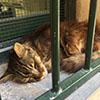October 9, 2015 - 20:09

Wild, by Cheryl Strayed, is a novel greatly influenced by the dichotomy between power and fear and the attempt to overcome fear using power. The following passage about her rejection of fear clearly defines Strayed’s struggle between the two forces:
Fear, to a great extent, is born of a story we tell ourselves, and so I chose to tell myself a different story from the one women are told. I decided I was safe. I was strong. I was brave. Nothing could vanquish me. Insisting on this story was a form of mind control, but for the most part, it worked. Every time I heard a sound of unknown origin or felt something horrible cohering in my imagination, I pushed it away. I simply did not let myself become afraid. Fear begets fear. Power begets power. I willed myself to beget power. And it wasn’t long before I actually wasn’t afraid (Strayed 51).
Now I would like to focus on the word ‘beget,’ which I have placed emphasis on in this passage. To beget is (1) to procreate or generate (offspring) and (2) to cause or produce as an effect. It originates from the Old English term begietan, meaning to get or obtain by effort (Oxford Dictionary). Beget has a biblical connotation as well, which C.S. Lewis discusses in further detail in Mere Christianity. Returning to the passage, what does it mean to “beget fear,” or to “beget power?” C.S. Lewis states, in response to the Nicene Creed, that there is a common misconception that ‘to beget’ is synonymous with ‘to create,’ when actually, “to beget is to become the father of: to create is to make. And the difference is this. When you beget, you beget something of the same kind as yourself […] But when you make, you make something of a different kind from yourself.” With this concept in mind, it can be assumed the fear and power Strayed speaks of are not being generated out of sheer willpower, for they can only be begotten from like emotions. In Strayed’s quote it is therefore implied that, “fear [only] begets fear. Power [only] begets power.” The strength and determination Strayed demonstrates by accomplishing what she set out to do, hike the Pacific Crest Trail, reflects the success of Strayed’s endeavor to beget power. She begets power, and so the power begotten by her must have stemmed from power which had always been harbored within her.
Strayed continues to allude to her method of begetting power in the second half of the book. After wandering off the trail she says, “I was lost but I was not afraid, I told myself” (Strayed 216). This displays Strayed’s need to reassure herself before the fear begotten of her instinctive wariness becomes excessive. In an interview of Strayed I attended at Bryn Mawr College, she commented that “our normal sense of security is simply a story we tell ourselves. We have an expectation of safety in our everyday lives that is not a reflection of reality. People can’t live every day in fear, but it is dangerous to pretend the danger isn’t there.” She explained that in the natural world, opposites— life and death, fear and courage, happiness and suffering— are not as far apart as we may perceive them to be. In reality, there are no true opposites. Contrasting forces may seem to be mutually exclusive of one another, but actually coexist in complex relationships. We can be aware of our fear and still be brave. Cheryl Strayed is a prime example of this. Her vulnerable state at the beginning of her hike allows her no room for fear. Allowing fear to affect her before discovering the strength as she did later in the book, would have lead to a collapse of the carefully constructed “story” of security she persists to tell herself. Without her expectation of relative safety she would have been consumed by fear. As her character evolves, Strayed eventually reaches the point where she is forced to admit that fear in not a weakness, but another part of her power. As she pointed out during her interview, humans cannot live in constant fear, and cannot live in rejection of fear. Mental stability relies on finding a balance between ignoring fear and being overwhelmed by fear, between recklessness and constrictive amounts of caution. Her revelation that, “perhaps by now I’d come far enough that I had the guts to be afraid” is evidence of her growth (Strayed 229). In the process of finding herself, Strayed is able to accept her fears because she finds the power that was already within her, and uses it to control her fear.
Wild is a book about self empowerment. It is the story of a woman who loses the most important person in her life and believes she has also lost her source of strength. She feels devastating pain and fear of living without her mother, but in reality the same strength she rediscovers after her odyssey through the wilderness has always been a part of who she is. Because she begets power, and power can only be begotten from power.
“beget, v.” Oxford English Dictionary. OED Online. Oxford University Press. 8 Oct. 2015 <http://dictionary.oed.com/>.
Lewis, C. S. "Making And Begetting."Mere Christianity: A Revised and Enlarged Edition, with a New Introduction, of the Three Books, the Case for Christianity, Christian Behaviour, and Beyond Personality. New York: Macmillan Pub., 1960. Usminc.org. Web. 8 Oct. 2015.
"Nicene Creed." Encyclopedia Britannica Online. Encyclopedia Britannica, 20 Apr. 2014. Web. 09 Oct. 2015.
Strayed, Cheryl. Personal Interview. 8 Oct. 2015.
Strayed, Cheryl. Wild: From Lost to Found on the Pacific Crest Trail. New York: Alfred A. Knopf, 2012. Print.
